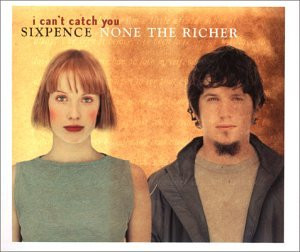 |
Look how young and sexy this band was 22 years ago.
|
Q: Why is this not the third single from the self-titled album?
A: Technically, it is.
Q:What do you mean? I never heard this song on the radio.
A: I think I did, once, actually, but it might have been in the "Case of the Missing Hit" style "test market" way, where a song gets played a few times on a few stations but if it doesn't have legs it doesn't get support.
Q: What do you mean by "support," exactly?
A: That's a good question. I have a vague sense that it is literally person-power, in those days in the form of mailing things and making phone calls, trying to get program directors to add singles to regular rotation. My experience of this was in college radio, and I definitely had a warped sense of the importance of it all -- I even sort of believed that because these people who were being paid a couple of thousand dollars to work on a record for a few months were regularly calling me, that I was somehow part of The Thing we were all doing (what was The Thing? The 'music industry?' 'The arts?'). I would even call them back when they left messages, which I know sounds a like a polite and normal professional thing to do, but now I realize this is tantamount to calling a telemarketer back if you missed their call. In any case, there seems to have been little appetite, either from record company or radio-listening public, to turn "I Can't Catch You" into a single.
Q: You know that apocryphal-sounding story about the online chat Rivers Cuomo had with Weezer fans years ago, where someone asked him why Songs from the Black Hole never came out, and he replied simply "rotr," which allegedly implies that Matt Sharp's Return of the Rentals album covered such similar thematic ground as the putative second Weezer album (a synth-heavy, space-themed concept album, which to be honest Return of the Rentals is not, but I guess you could somehow make the argument that some of it is)?
A: Yes, but I don't see what that has to do with this.
Q: Well, you have several times compared Sixpence's relationship with "Kiss Me" to Radiohead's with "Creep," so I thought maybe you'd get the analogy.
A: That's not a question.
Q: My point is, from a larger pop-culture perspective, anything Sixpence does or did always has to contend with "Kiss Me," or to a lesser extent, "There She Goes." These are both so large in the public imagination that they are almost the only things anyone knows about this band. And "I Can't Catch You" was released as a single (in Australia at the very least) immediately after both of these, probably in the aftermath of the second pressing of the album (with "There She Goes" tacked on), so the fact that it didn't sound like either of these must have been its death knell, don't you think?
A: I sort of do think that, but somehow there's more to this. The song is somehow both too simple and too complex to have succeeded on pop radio. Melodically it's as catchy as anything, and that chorus might even veer further into the ethereal lightness of the Sundays -- man, remember that band? Did you know they broke up in 1997, the year Sixpence None the Richer was originally released?
Q: Yes, because I am you and I also just read that on Wikipedia. But who's asking the questions here, anyway?
A: I'm sorry.
Q: Anyway, you were saying something about how "I Can't Catch You" is both simple and complex, which is of course impossible. Care to elaborate?
A: What is mean is, the riff is complex, but the production is minimalist. It might be the perfect marriage of the guitar-rock-driven Sixpence and the pure aural pop candy Sixpence, but there's somehow not enough of something to make this a big MTV/radio/mall/car speakers song. Not enough what, though -- reverb? Compression? Room sound on the drums? There's nothing dumbing the song down to its melody -- it's a beautiful tangled mess of guitar riff, bassline, vocal -- every part stands out by itself. It's like when you get stoned and you somehow can hear each component of a sound as if it is a separate entity. It's also got that classic thing Slocum does where he plays riffs on the B string but hits the open E every once in a while, which is always great, but it's just another layer of stuff that makes this song too much for pop radio. And man, the way the bassline sneaks higher and higher at the end of the verse? *Chef's kiss*
Q: I thought you said it was not "enough," not "too much." But whatever. What about the lyrics? Is it not happy-go-lucky enough, maybe?
A: It's kind of opaque, I suppose -- who is "you?" What are "these bags in the way?" But yeah, this song is depressing in a way that a lot the Sixpence catalogue is, and that people who liked "There She Goes" probably wouldn't dig -- "what's there to love about myself?" But I don't really see that as the main impediment to radio success.
Q: It's 2022. Why on earth are you still talking about the radio?
A: You might have a point there.

